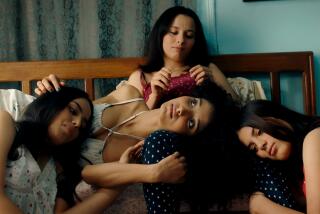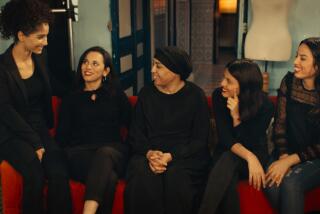Egyptian film director took on fundamentalism
Youssef Chahine, an Egyptian filmmaker whose work over nearly five decades made him a renowned figure in Arab cinema, died Sunday at Al Maadi Military Hospital in Cairo. He was 82.
Chahine fell into a coma last month after suffering a brain hemorrhage and was flown to France in critical condition for treatment. According to Egypt’s official news agency, MENA, he was returned to Cairo for further treatment.
In more than 40 films and documentaries, Chahine sought to recapture and defend the spirit of multicultural tolerance against the forces he saw undermining it -- fundamentalism, dictatorship and imperialism.
Chahine was honored with a lifetime achievement award at the 1997 Cannes Film Festival. His “body of work [is] as full and satisfying as that of any Hollywood auteur,” critic Dave Kehr wrote in Film Comment. “Like many of his American studio counterparts, Chahine seemed to thrive on his interaction with the system, tackling an impossibly wide range of genre assignments and managing to impose his unmistakable signature on each one.”
Since the early 1990s, his sometimes politically controversial films began to draw opposition from Islamic fundamentalist elements in Egypt. In 1994, his film “The Emigrant” was banned after a fundamentalist lawyer objected that its plot was based on the story of Joseph, found in the Bible and the Koran. The depiction of prophets is banned under most interpretations of Islam.
Chahine was born to a middle-class family in Alexandria, Egypt, on Jan. 25, 1926. His attorney father was of Lebanese heritage, and his mother was Greek. Five languages were spoken in his home as he was growing up, and Chahine was educated at private schools, including the elite Victoria College, an English-language institution in Alexandria.
From an early age, Chahine was fascinated by the theater and began staging plays at home. After a year at Alexandria University, Chahine persuaded his parents to let him study in the United States. Between 1946 and 1948, Chahine studied acting at the Pasadena Playhouse.
He made his first film, “Father Amine” in 1950, and his second film, “The Nile’s Son,” was released a year later and earned a good response at the Venice Film Festival, which gave his career a large boost. In 1953, he cast Omar Sharif, then a relatively unknown actor, in “Struggle in the Valley.” In 1958, Chahine cast himself as the lowly train station newspaper vendor Kennawi whose love for a co-worker drives him to murder in the movie “Cairo Station.”
His early films were considered classics of social realism. Some critics view his 1969 work, “The Land,” which told an epic story of peasant farmers and landowners struggling over land in the Nile delta, as his finest film.
His work started receiving serious attention in the West after French writer Jean-Louis Bory began organizing Chahine screenings in Paris.
“Many people in Europe thought that all we could do was make light comedies -- with belly dancing scenes, obviously -- though some of us were working hard and making more worthwhile films, often on shoestring budgets,” Chahine recalled in an interview with the UNESCO Courier.
After suffering a heart attack in the mid-1970s, Chahine reexamined his career and returned to the screen in 1978 with the first installment of his well-received autobiographical trilogy, “Alexandria . . . Why?” which won a special jury prize at the Berlin Film Festival that year.
The trilogy recounted his childhood in Alexandria, his love of Hollywood and his ambiguous feelings toward the U.S., which he was drawn to but also saw as an overweening power. “I have a problem with America, you call it a dilemma,” he once told an interviewer. “I use to love it very much, I studied there, my first love was there. . . . I don’t hate America as some think . . . but it is difficult to sympathize with it.”
The trilogy broke with the realistic style of many of his earlier films, bringing in Fellini-esque scenes of wild fantasy, musical numbers and surrealism. The first installment also raised eyebrows by telling the story of two taboo love affairs -- one a homosexual relationship between an Egyptian man and a British soldier, the other between a Muslim man and a Jewish woman. His last movie, 2007’s “This Is Chaos,” was a sharp criticism of the Egyptian government’s crackdown on democracy activists and depicted a corrupt police officer who takes bribes and tortures detainees.
Chahine had no children. He is survived by his wife, Colette.
More to Read
Only good movies
Get the Indie Focus newsletter, Mark Olsen's weekly guide to the world of cinema.
You may occasionally receive promotional content from the Los Angeles Times.










